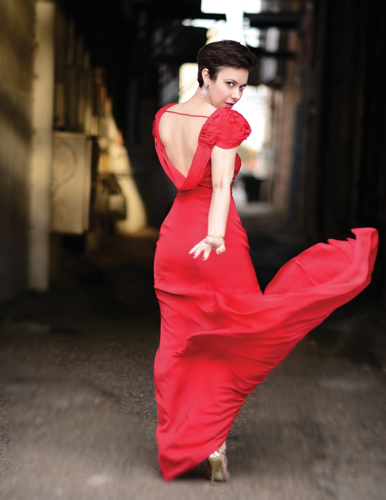
Eliza bonet will play Mistress Salome in “safe word” and Gillian DeBridge in “masquerade”
John Hoomes loves adventurous opera as much as any theatrical director. Still, he had qualms about Three Way, the delightfully naughty operatic triptych that Nashville Opera will premiere Jan. 27-29 at TPAC’s Polk Theater.
In this opera’s second act, titled “Safe Word,” a Dominatrix in thigh-high leather boots calling herself Mistress Salome goes to town on a masochistic, cross-dressing Client called Polly Puddlepanties. Hoomes, who first encountered the piece at an opera workshop several years ago, loved the story and the music. But would an older audience feel the same way?
“I met with the opera’s composer [Robert Paterson] right after the performance, and I told him I wanted to stage the opera but wasn’t sure what donors and subscribers would think,” Hoomes tells the Scene. “As we were talking, this old lady walked up to us and said she really loved that Dominatrix. I think that convinced me to take the chance.”
Hoomes has been taking his chances with risqué contemporary opera for the past several years. His 2012 staging of David Lang’s gothic opera The Difficulty of Crossing a Field was widely praised, as was his eyebrow-raising production of Philip Glass’ Hydrogen Jukebox in 2015. Hoomes’ critically acclaimed production of the contemporary Spanish-language opera Florencia en el Amazonas made its way to New York City’s Lincoln Center last year. This summer, he’ll take Three Way to the Brooklyn Academy of Music’s new Fishman Space.
“We’ve had a pretty amazing track record with contemporary opera,” says Hoomes.
Interestingly, the thing that attracted Hoomes most to Three Way was neither its newness nor its naughtiness. Rather, it was the comedy. “For whatever reason, contemporary opera tends to be deadly serious,” Hoomes says. “Three Way stands out because it’s funny. I think of it as Sex and the City meets the Twilight Zone.”
Three Way consists of three one-act operas, each taking a humorous yet poignant look at sexual relationships. In the first act, titled “The Companion,” a woman attempts to find the perfect lover in an anatomically correct automaton. Turns out this paranoid android is more in touch with his feelings than the humans.
Loneliness is an underlying theme in “Safe Word,” where fetish replaces intimacy. The final act, “Masquerade,” is set at a Pleasure Pilgrims swingers’ party, which features the sort of lusty innuendo found in Mozart-Da Ponte operas.
Three Way has one other thing in common with Mozart: heartfelt lyricism. “When it comes to writing arias, I’m basically old-school,” says composer Robert Paterson. “I love melody.”
Other classical shows worth attending include:
Nashville Symphony plays Holst’s The Planets: The inspiration for Gustav Holst’s wildly popular orchestral essay came not from astronomy but mythology. His “Mars” is the “Bringer of War,” not the red planet. Be that as it may, Giancarlo Guerrero and the Nashville Symphony will perform this blockbuster as the soundtrack to some of NASA’s most spectacular space footage. (See Critics’ Picks on p. 21.) Jan. 12-15 at the Schermerhorn
Intersection at Fisk: The contemporary music ensemble joins forces with Choral Arts Link’s MET Singers to present a tribute concert to Martin Luther King Jr. Jan. 12 at Fisk Memorial Chapel
Alias Chamber Ensemble at OZ: Nashville’s daring chamber group makes its debut at OZ Arts Nashville, performing one of the pillars of 20th-century music, Olivier Messiaen’s Quartet for the End of Time. The program, which also features Alexandra du Bois’ Night Songs, honors International Holocaust Remembrance Day. Jan. 24 at OZ
Berlin Philharmonic Wind Quintet at Blair: These legendary Berliners return to Vanderbilt University’s Blair School of Music to perform an eclectic program that includes Mozart’s Fantasy in F minor for Clockwork Organ, K. 594, Ligeti’s Six Bagatelles, Nielsen’s Quintet for Winds, and the American premiere of Kalevi Aho’s Quintet No. 2. Feb. 1 at Blair’s Ingram Hall

Alice Coote
Alice Coote and Julius Drake at Blair: World-renowned British mezzo-soprano Alice Coote and pianist Julius Drake tackle arguably the greatest song cycle in classical music, Schubert’s Winterreise, a heartrending winter trek filled with breathtaking musical vistas. Feb. 7 at Blair’s Ingram Hall
Nashville Symphony plays Pines of Rome: Respighi’s evergreen take on Rome’s glorious pines glistens with brilliant orchestral effects. Guest conductor Peter Oundjian is pairing it with another glittering showstopper, Saint-Saëns’ dazzling Piano Concerto No. 2 in G minor (with pianist Javier Perianes). Feb. 10-11 at the Schermerhorn
Nashville Symphony plays Rite of Spring: Is it spring yet? No matter. Giancarlo Guerrero and the NSO provide their own thaw with a pyrotechnical performance of Stravinsky’s rhythmically vital score. The concert also features American composer Terry Riley’s At the Royal Majestic. Feb. 23-25 at the Schermerhorn
Roomful of Teeth at Blair: This remarkable Grammy-winning nine-voice ensemble has performed everything from Inuit throat singing to Sardinian cantu a tenore. Naturally, the ensemble works with many of today’s leading composers. One of its members, Caroline Shaw, is herself a Pulitzer Prize-winning composer. March 15 at Ingram Hall
Nashville Symphony plays Meyer and Ravel: Giancarlo Guerrero and his musicians present the world premiere of a new orchestral piece by Nashville composer Edgar Meyer. A double bass phenom, Meyer will also solo in Bottesini’s Concerto No. 2. Ravel’s Bolero rounds out the program. March 16-18 at the Schermerhorn
Music City Baroque: Nashville’s premier period-instrument group joins forces with world-renowned Baroque flautist Barthold Kuijken to perform music of France. March 26 at West End United Methodist Church
Chatterbird at the Weld: Music City’s alt-classical group presents a pair of concerts featuring composer Ted Hearne’s Outlanders and Katrina Ballads. March 31-April 1 at the Weld
Nashville Symphony plays Shostakovich and Bernstein: Shostakovich’s Symphony No. 10 is one of the undisputed masterpieces of the 20th century, a work that juxtaposes poignant lyricism with white-hot intensity and drama. The program also includes Bernstein’s Serenade (with violinist Anne Akiko Meyers). March 31-April 1 at the Schermerhorn






